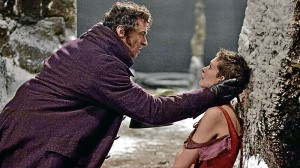‘Les Miserables’ boosts Jackman and Hathaway’s Oscar chances
It’s thrilling to see the chaotic world imagined by Victor Hugo’s hefty 1862 novel finally come to life on the big screen. With Claude-Michel Schönberg and Alain Boublil’s music and lyrics framing its epic tale, the jump of “Les Miserables” from page to stage to screen is a Herculean endeavor that Tom Hooper faces with nervous alacrity—with good reason: Since it opened at the West End in 1985, “Les Miserables” has become musical theater’s biggest brand!
Set in 19th century France, the movie tells the story of Jean Valjean (Hugh Jackman), who goes on the lam 19 years after he’s hauled off to prison for stealing a loaf of bread. As he evades his relentless pursuer, Inspector Javert (Russell Crowe), he creates a new life for himself with his adopted daughter, Cosette (Amanda Seyfried)—who was entrusted to him as a young girl by fallen factory worker-turned-hooker, Fantine (Anne Hathaway).
Valjean’s struggle takes on a fatherly turn when Cosette gets caught up in a love triangle with student activist, Marius (Eddie Redmayne), and Eponine (Samantha Barks). Is he ready to sacrifice his daughter’s happiness for his freedom? Just as Valjean drags Marius out of imminent harm, Javert shows up again, all psyched up for his much-awaited mano-a-mano with his elusive prey!
From its gorgeously imagined set pieces to the formidable cast’s evocative portrayals, it’s easy to understand the raves the movie is getting. Hooper paces his film with unrelenting urgency, never allowing the story’s melodramatic flourishes to degenerate into schmaltzy contrivances.
Even with Helena Bonham Carter and Sacha Baron Cohen breathing feisty, quirky life into the Thenardiers, the production keeps things on an even emotional keel—which is what makes its scenes even more engaging!
Article continues after this advertisementPlea for help
Article continues after this advertisementIn a short but vanity-free portrayal, Hathaway renders the iconic show tune, “I Dreamed A Dream,” as an anguished plea for help that empathetically convinces Valjean to champion Fantine’s parental cause. The Oscar-bound actress conveys palpable grief without raking up the thespic muck.
Jackman, almost unrecognizable in earlier sequences, also goes for the jugular but keeps his scenes from getting treacly by turning in a thoughtfully calibrated performance, boosted further by his dramatic baritone voice.
But, the actor’s confrontation scenes with Crowe are largely compromised by the latter’s tottering singing voice.
To be fair, Crowe sings better than Daniel Day-Lewis—who struggled with his morose singing in Rob Marshall’s 2009 screen adaptation of “Nine”—but, his gravitas isn’t enough to camouflage the limitations of his singing prowess.
The instructive rule when casting crucial characters in musicals is to prioritize outstanding actors who can sing their way out of difficult tunes more than fine singers with limited acting skills. Think Jonathan Pryce in “Miss Saigon,” orJudy Dench, who “character-sung” “Send in the Clowns” in “Little Night of Music” many years ago.
But, some show tunes require beautiful and masterful singing—like “What Kind of Fool Am I?,” (from “Stop the World, I Want To Get Off”), “Memory” (“Cats”), “Putting It Together” (“Sunday In The Park With George”), “And I Am Telling You I’m Not Going” (from “Dreamgirls”)—and “Stars,” Javert’s valedictory, which requires more than paltry, karaoke-style bombast!
